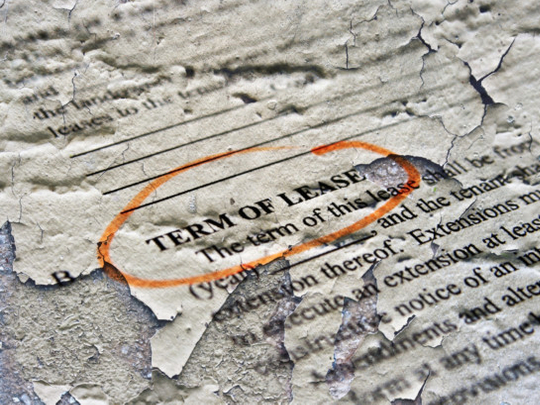
Landlords and tenants are familiar with the green lease form that has been widely used in the market. Starting this month, they will have to use a new unified tenancy contract for all residential, commercial and industrial lease agreements. The biggest difference between the green form and the new unified form is the omission of unlawful terms. For example, the old form included clauses that renewal is at the discretion of the landlord, and that the lease is null and void after the expiration date. Under Dubai’s tenancy law, a tenant has an automatic right of renewal, unless a valid legal reason and notice is given for eviction.
The unified contract includes the following terms:
* The tenant has inspected the premises and agrees to lease the unit in its current condition.
* The tenant will use the premises for its designated purpose and has no right to transfer or sublease the premises, unless it is legally permitted.
* The tenant will not make any modifications to the premises without obtaining the landlord’s written approval.
* The tenant must pay all electricity, water, cooling and gas charges, unless otherwise agreed.
* The tenant agrees to comply with all regulations related to the use of the premises and common areas such as parking, pool, gym, etc.
* Any dispute arising from the contract will be settled by the Rental Disputes Settlement Centre (RDC).
* The contract is subject to the laws and regulations of Dubai.
* Additional terms and conditions in conflict with the law will be invalid.
In addition to the above, there are essential terms that should be added to avoid disputes. These can be printed in the blank spaces provided on the form. Or, an addendum may be attached to the contract, with words such as “See attached addendum”.
Maintenance issues
The law states that the landlord is responsible for the repair of any damage or defect that may affect the tenant’s intended use of a property, unless otherwise agreed by the parties. This means that major repairs should be covered by the landlord, unless the lease places the responsibility on the tenant. However, the law does not define what would be considered a major repair. If it is not defined in the agreement, it will be left to the RDC judges to decide.
Termination notices and penalties
Contrary to popular belief, the law does not require the tenant to give a 90-day notice to the landlord for non-renewal. (Although Article 14 of Law 26 of 2007 required a 90-day notice for non-renewal, Article 14 of Law 33 of 2008 deleted such requirement.) That being the case, the landlord may want to specify the notice period required by the tenant and any corresponding penalties that will be imposed in case of a breach of the notice clause.
The law is silent on early termination of the lease agreement, so if there is no early termination clause and the tenant wishes to terminate the lease prior to expiration, the tenant is at the mercy of the landlord when seeking a refund of the remaining rent. Therefore, it is in the tenant’s best interest to include an early termination clause that states how much notice must be given and the penalty, if any.
Condition of property upon vacating
The law states that a tenant must hand over the premises in the same condition in which it was received, with the exception of ordinary wear and tear or damage due to reasons beyond the tenant’s control. “Wear and tear” is not defined by law. In a dispute, it is the RDC that decides whether the repairs can be deducted from the security deposit.
Violations committed by a tenant
Sometimes tenants violate owners’ association, Dubai Municipality or other regulations that may result in a penalty being levied on the owner of the property. To avoid the landlord paying these fines out of pocket, the lease should clearly state that the tenant will be liable to pay such penalties, if not, the fine will be deducted from the security deposit. There should be a statement reflecting that the tenant acknowledges notice of this policy, and will not challenge it in a judicial proceeding.
Other terms
Any terms that are of importance to either party should be included in the agreement. For instance, if the tenant has a pet, there should be a clause allowing pets. Make sure that any additional terms do not violate the law or the owners’ association rules and regulations.











